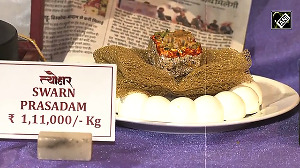Former Dutch Premier Ruud Lubbers has said that the Netherlands government, in 1975 and in 1986, had refrained from acting against disgraced Pakistani nuclear scientist Abdul Qadir Khan following requests from the United States Central Intelligence Agency, media reports said.
A Q Khan transferred centrifuges to N Korea
Dutch newspapers, Telegraaf, NRC Handelsblad, and Radio ARGOS quoted Lubbers as saying that BVD, the Dutch intelligence agency, had also asked the ministry of economic affairs in 1975, then headed by him, not to act against Khan.
"I think the American intelligence agency put into practice what is very common there; just give us all the information. And do not arrest that man; just let him go ahead. We will have him followed and that way gain more information," Lubbers told VPRO Argos Radio in an interview.
According to the interview transcript, he asked, "what are we doing here? We have watched this man for 10 years already. Apparently, he is up to some fairly serious things. .... And again I'm told: No, just leave it to the intelligence agencies. .... Yes, in hindsight that is very stupid indeed."
Pak refuses US access to A Q Khan
The economic affairs ministry, then headed by Lubbers, had in its purview Urenco, the uranium enrichment firm in Almelo where Khan worked in 1975 when suspicions about his spying had arisen in the Dutch government circles.
Asked when did he first hear Khan's name, Lubbers said Khan was "a young Pakistani who works there (Urenco) and there are indications that he is doing things he shouldn't. He takes home information and copies it. And we have to sort that out. And maybe deny him entry from now on."
Lubbers, who later rose to become the prime minister of the Netherlands, also said, "I seem to recall from those days that I had once asked whether it is sufficient to merely deny him entry or should we do more. The answer I was given at that time was that the American intelligence agency preferred not to arrest the man but to have him followed."
Complete Coverage: Pakistan's nuclear bazaar
In the radio interview, he maintained that Khan was "caught in the act" by the security regime in Urenco which "reported it to the BVD. The BVD reported it to its counterpart in Washington.
"The counterpart in Washington then follows a course that amounts to: let him go and we will gain more information. And that is where things start to go wrong," Lubbers said.
The Dutch newspapers, Telegraaf and NRC Handelsblad, also reported that the matter was debated in the Netherlands Parliament and that a Dutch businessman appeared before the local courts on charges of trying to supply parts for nuclear bombs to Khan.





